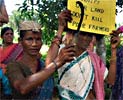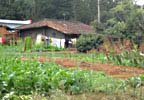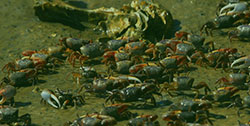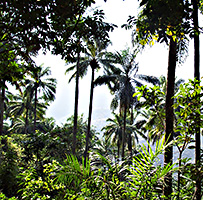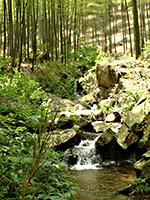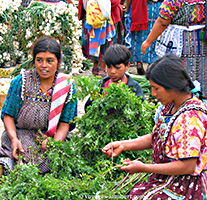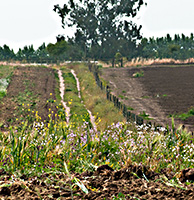Gaomi District, Shandong Province, China – 1934 (1)
Crab hunt
Douguan almost cannot control himself, and is on the point of jumping up. Uncle Arhat pulls the eight-year-old boy down and says: “When you have no patience, you will not get warm rice pudding.” Breathing heavily through his nose, Douguan sits down again. It is a beautiful autumn night, the dark heaven is studded with stars, bigger ones and smaller ones, some twinkling, others beaming. Silently the water of the river splashes against its bank. A few feet away from them sits a kerosene lamp with four panes of green glass, which casts a vague circle of light on the ground.
Douguan has already waited several hours with Uncle Arhat. When it became dark, the river crabs came crawling out of the water to look for food among the plants. First they came one by one, then by dozens. Slowly but steadily they go to the lamp, till there are hundreds, many hundreds sitting near the lamp. “Now!”, Uncle Arhat hisses. Douguan jumps up like a compressed spring, which is released. He catches two corners of the net where the crabs are sitting, and pulls them up, while Uncle Arhat pulls the other two corners. They bring the four corners together, tie them quickly with a big knot, and throw the tied net aside. Immediately Douguan jumps to the second net, and pulls also from this one two corners up.
They have caught hundreds and hundreds of crabs. Douguan is quite proud of it. They enjoy eating as many crabs as they want, and still more and more crabs – until it nauseates them. Uncle Arhat scrapes out the other crabs with a knife, grinds the meat, throws it in a vessel, adds salt, and stirs the whole to make a tasty paste. For months they eat crab paste, until the paste starts to stink. Then Douguan's mother throws it on the poppies. You get the most beautiful poppy flowers and balls thanks to this crab manure, and later on first-rate opium, which Douguan's mother enjoys.
Later on in his life Douguan remembers from time to time that beautiful autumn night by the bank of the river, together with Uncle Arhat, the greenish shine of the lamp and the thousands of restless shoving jointed legs and claws.
_______________________
Source
The book Red Sorghum (1986) from the Chinese writer Mo Yan tells the story of the bitter fight against the Japanese occupiers in a remote peasant region. The struggle between the Kuomintang, the communists and the local gangs of bandits is no less violent.
Go to:
= part 2: The fox ghost - Gaomi District, Shandong Province, China – 1937 (2), story 93.
= part 3: 'Take me back' - Gaomi District, Shandong Province, China – 1985 (3), story 137.
= the next page: Failure - a hamlet in New South Wales, Australia – about 1935 (2), story 87.
= the Table of contents, story 86.
